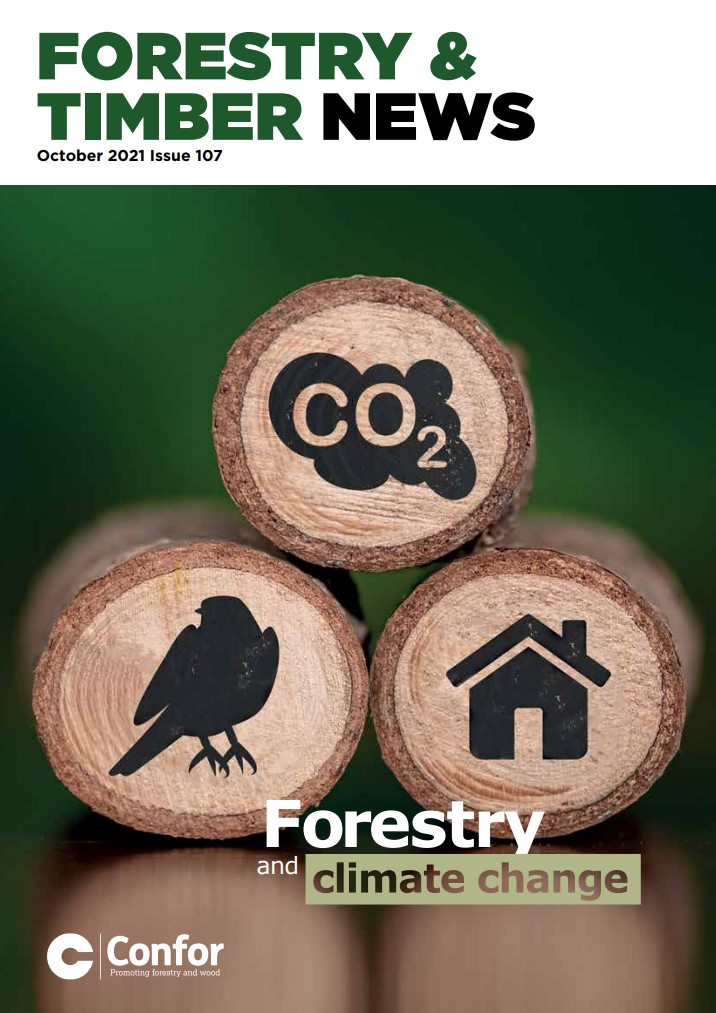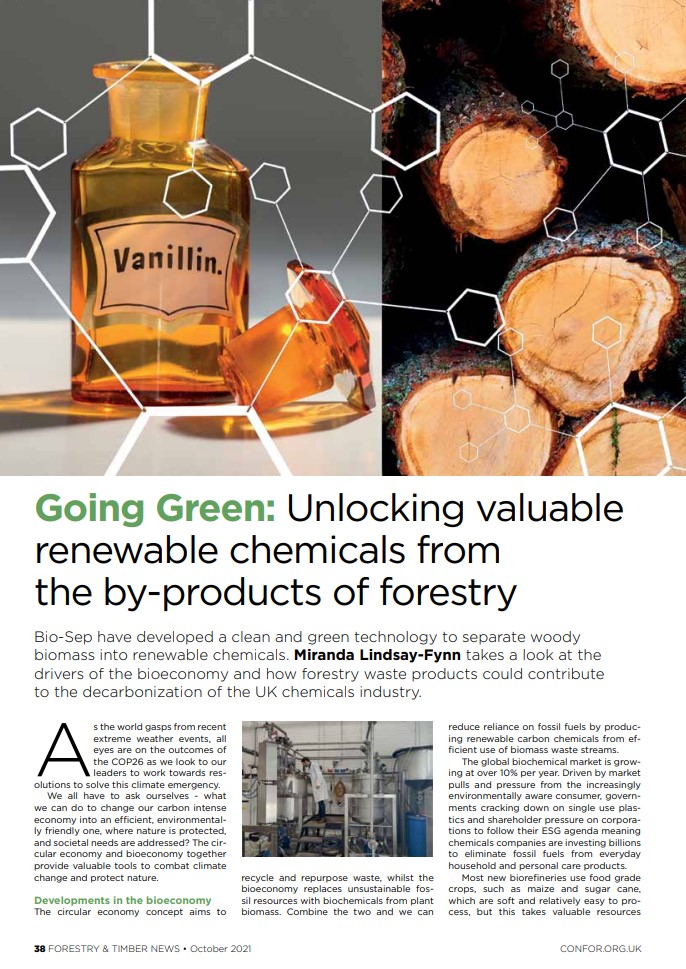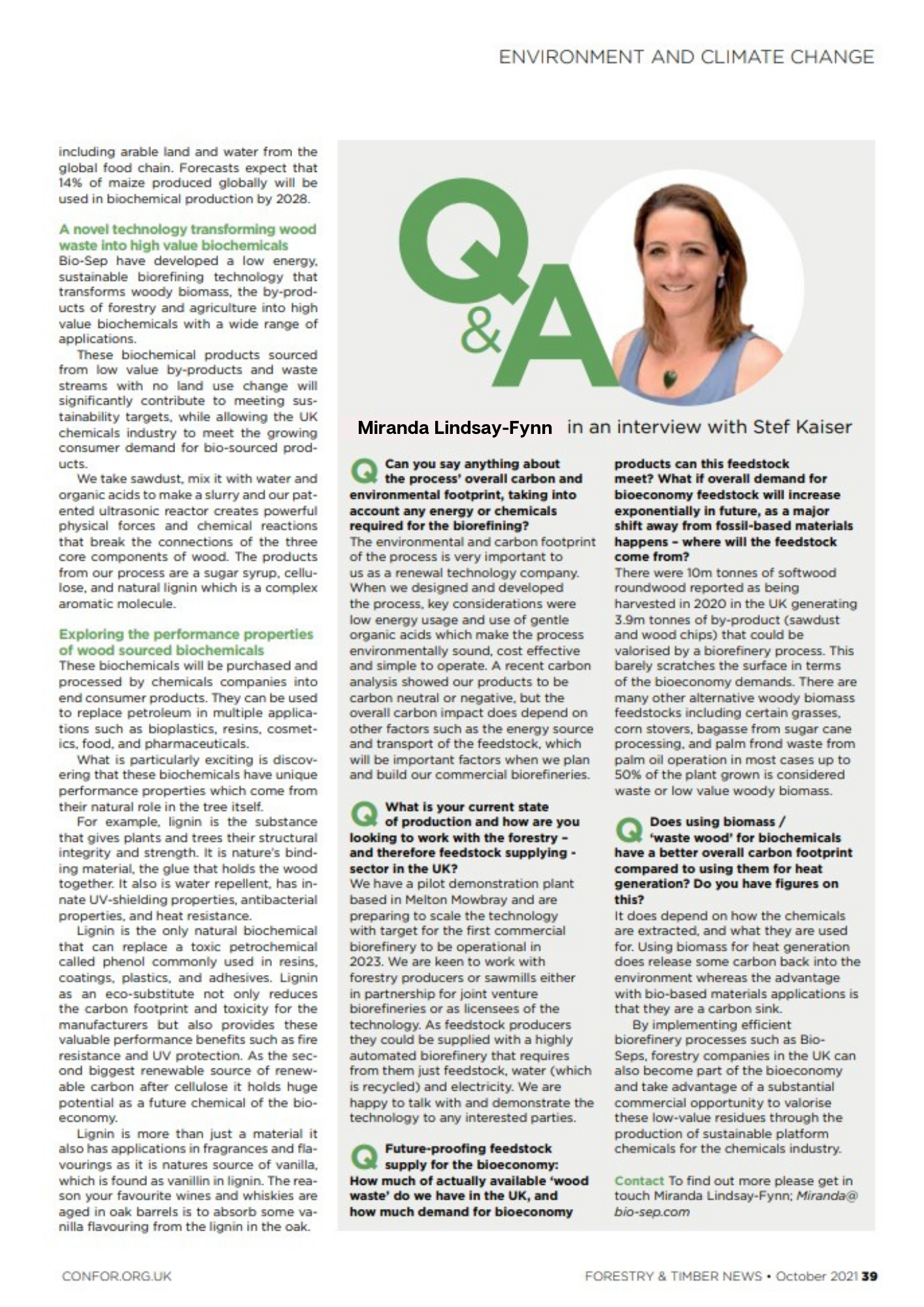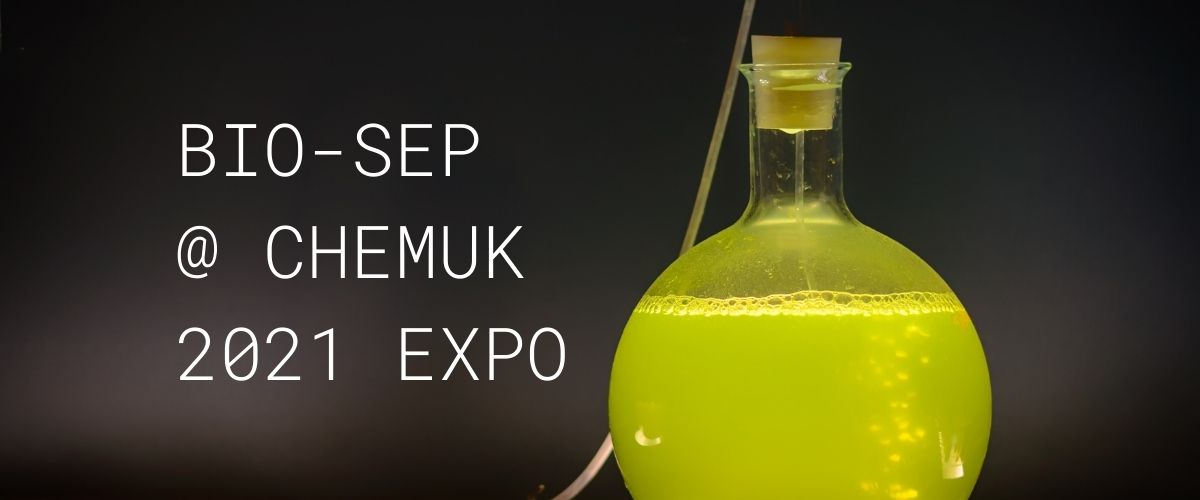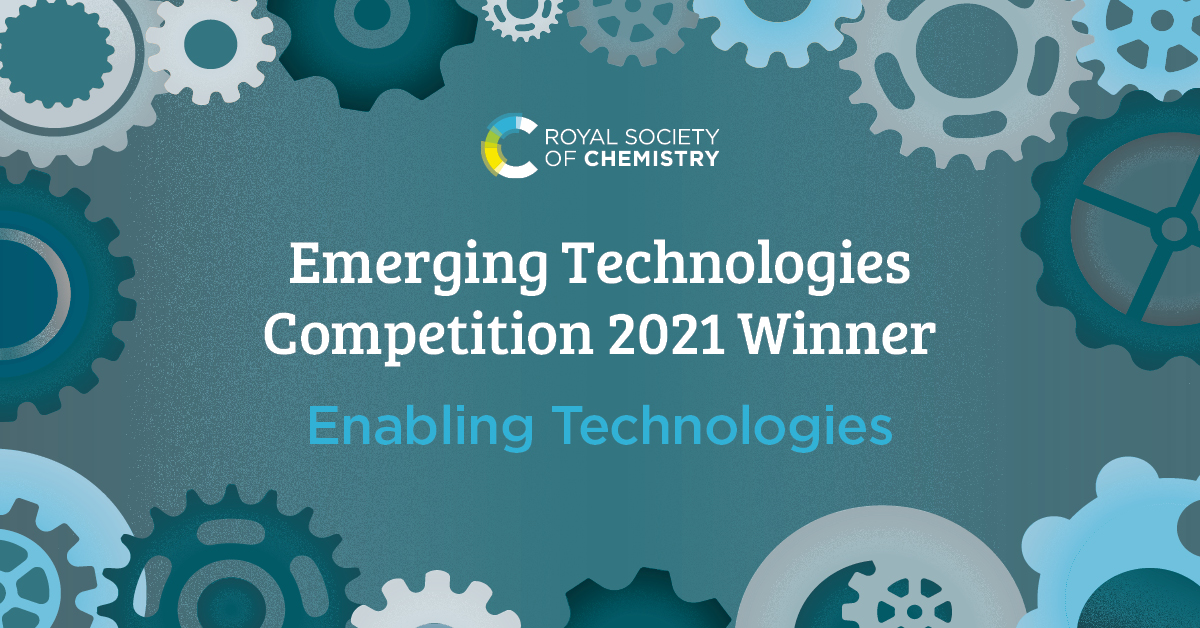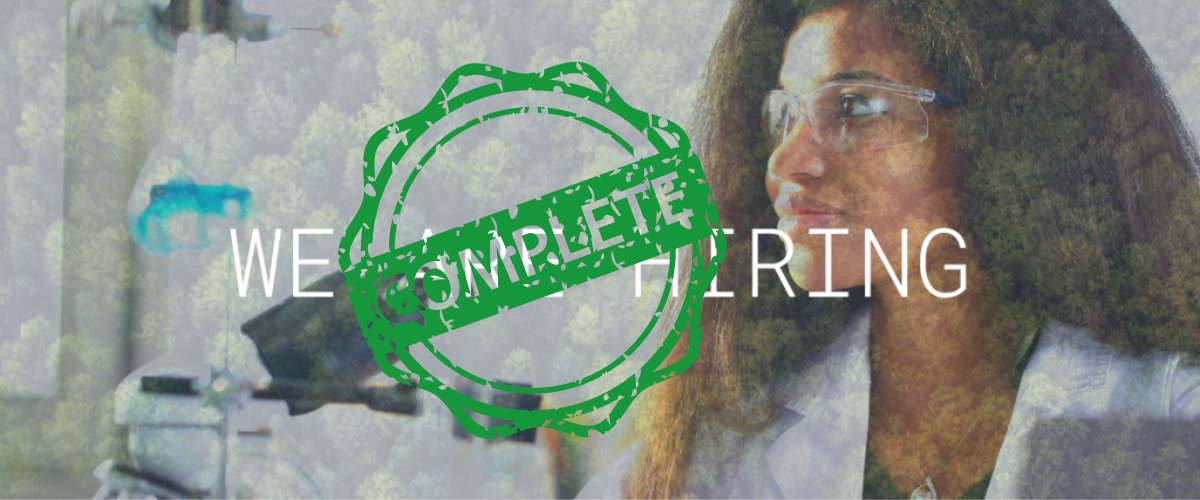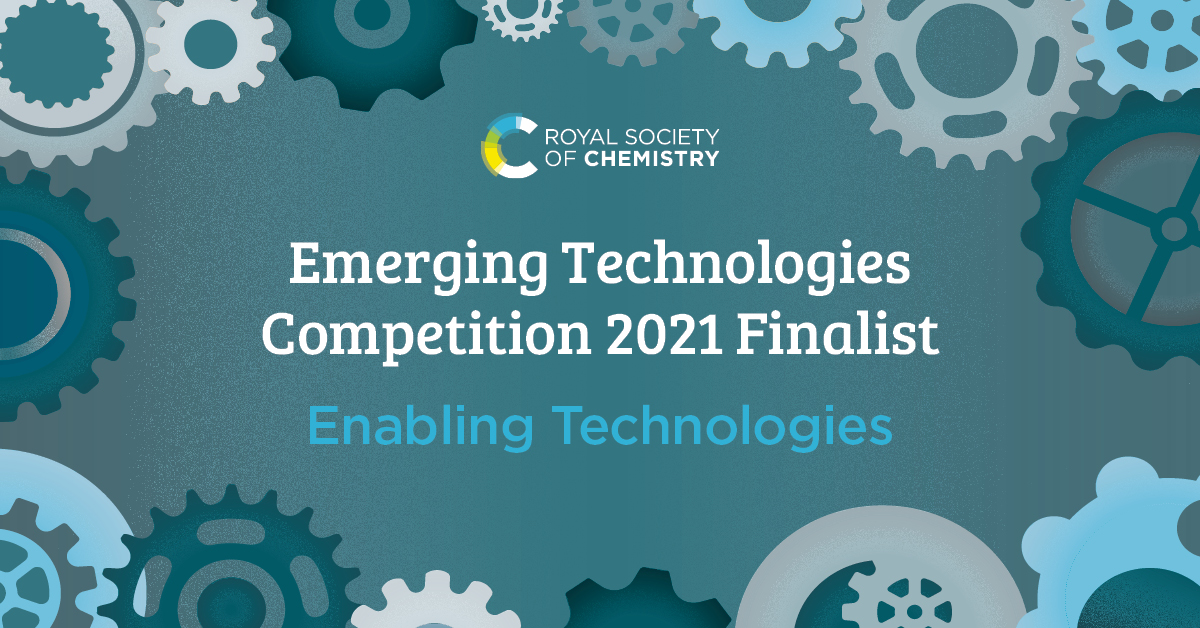Bio-Sep at ChemUK 2021 Expo
Bio-Sep is thrilled to announce that they have been invited to the ChemUK 2021 Expo to take part in the BioVale Biobased Chemicals Showcase. The 2021 Expo is particularly focusing on the rise in Green Chemistry supply chains and the growth of new processes and services that are supporting the transition to bio-sourced/bio-based industrial & consumer chemical products.
The BioVale showcase will be hosted by Anna Zhenova, CEO of Green Rose Chemistry as a ‘flash-talk’ session. Bio-Sep will be pitching our technology and bio-sourced chemicals amongst some of the UK’s leading green and bio-based chemicals start-up companies.
We will be at the ChemUK 2021 Expo for both days, if you would like to meet with us or find out more about our technology please fill out the form below.
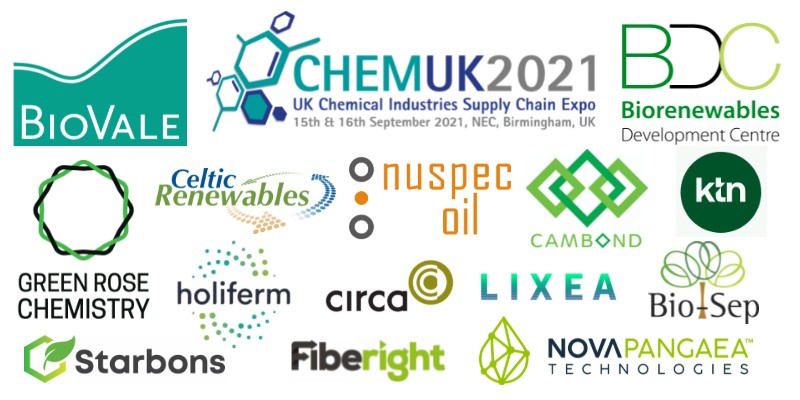
BioVale Biobased Chemicals Showcase
16th September 11.00-12.00 noon
- ‘Raw materials – redesigning basic oil properties for better performance of the finished lubricants’. Natalia Stawniak, CEO and Founder, Nuspec Oil
- ‘A case study approach to biodegradable, sustainable solutions for separating one entity from another’. Susan Brench, CEO Starbons
- ‘Bringing Biosurfactants to market’. Ben Dolman, CEO Holiferm
- ‘Developing an innovative biomass fractionation process using low-cost ionic liquids’. Krisztina Kovacs-Schreiner, CEO Lixea
- ‘Introduction to Nova Pangaea Technologies and REFNOVA®’. Neil Hindle, CTO Nova Pangaea
- ‘A revolution in environmentally friendly bioadhesives. Xiaobin Zhao, CEO Cambond
- ‘Our vision to be the world leader in Acetone-Butanol-Ethanol ABE fermentation’. Mark Simmers, CEO Celtic Renewables
- ‘Bio-Sep: Clean and green separation of low-value wood chips and plant matter into high-value biochemicals.’ Miranda Lindsay-Fynn, Commercial Director Bio-Sep
- ‘Fiberight – the waste refinery’. Dr Dhivya Puri, Head of Research and Development Fiberight
- Keracol – The foundation of Keracol Limited is sustainability with performance.
Request a Meeting
Emerging Technologies Competition Winner (Enabling Technologies), 2021
WINNER Sustainable Enabling Technology 2021
The Emerging Technologies Competition is the Royal Society of Chemistry’s annual initiative for early stage companies and academic entrepreneurs who want to commercialise their technologies to make a societal impact.
We were amongst the 24 finalists invited to pitch their technologies to a judging panel of industry heavyweights at an exciting virtual live final. We are thrilled to announce that we won our category; as an enabling technology.
Bio-Sep were chosen as winners as ''their technology aims to solve a critical global challenge namely the need for renewable carbon sources, and it looks to do this by making efficient use of an abundant waste stream.''
Jo Slota-Newson, Principal, IQ Capital Tweet
Jo Slota-Newson continued that ‘the judges were impressed with the breadth and depth of capabilities in the interdisciplinary team and, while the technology has a significant development path ahead, the team demonstrated a thoughtful approach that focused on the critical elements of scale-up. So we very much looking forward to seeing their progress from here on.’
Our chief chemist Dr Andy West, pitched our technology to an impressive panel of judges from global companies including AstraZeneca, PepsiCo and Unilever, organisations that we aspire to partner with in the future as we bring our products to market, including AstraZeneca, PepsiCo and Unilever.
Thrilled by winning our category and the impact it will have as we commercialise our technology over the coming year, he responded;
“For a small company to get this level of recognition from an organisation like the Royal Society of Chemistry and all of the judges involved is amazing, and the difference it will make is huge. Just that recognition that we’re making a difference or trying to make a difference is really really good, and the external validation will be brilliant for us.
“We’re in this take-up stage where we are really trying to push to get our technology on the market and one of the things we’re missing – which this win will really help with – is that validation of the products that we make, so we can now get a lot of external validation which would have previously been a big challenge for us – and that, again, will be a game changer for us.”
The prize includes a £20,000 cash prize, further business acceleration grants and a RSC mentor. We look forward to meeting the Royal Society of Chemistry’s Entrepreneur in Residence – Steve Pleasance, who will start our mentoring programme.
Dr Andy West
Meet the Team Dr Andy West, Chief Chemist
The following is the first in our Meet the Team series and we commence with an interview with Andy West.
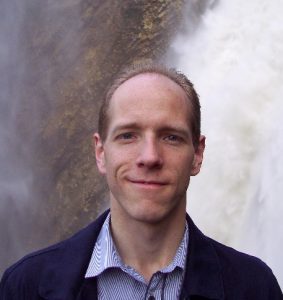
Dr Andy West,
a Chartered Chemist and a Chartered Scientist, Andy has extensive experience providing innovation consultancy and technology transfer support for SMEs, particularly related to sustainability, waste as a resource and climate change mitigation. Andy looks after all of the chemistry aspects at Sonichem from processing, handling product separation, and also all the front end research and development.
What do you enjoy most about your role?
I think it’s a cliche that people often say “Every day is different”, but in what is quite a small business at the moment, it is true for me. Every day is very different, and it’s really broad so I’m a chemist by training, but I’m involved in all sorts of things now that I wouldn’t normally get involved with, in a bigger business.
What excites you the most about Sonichem?
Sonichem (formerly Bio-Sep) is on a very interesting journey. The opportunity to work in lots of different areas is fascinating for me from a company point of view.
What’s also exciting is that the technology that we’ve developed over time is completely novel. There isn’t anything else like it on the market, and the impact this technology could have on the world in terms of reducing carbon emissions, saving cost and import substitutions and helping people is really exciting.
It’s a very interesting technology. So for a chemistry geek like myself, it is a great business to be involved in.
The journey of the company means that this is something that I think is going to grow from a small company based in the heart of England, to something that could be national, international, and much, much bigger.
Let’s talk about the carbon emission piece because I think that’s very topical at the moment, could you explain how Sonichem technology helps reduce carbon emissions?
An awful lot of the materials that we’re looking to process would currently be either burnt or sent for landfill and all of that carbon that’s been embedded in those products, so things like wood waste or municipal solid waste will get lost over time, released into the environment.
Natural degradation or burning will release all of that carbon that’s trapped within those materials into the environment. The Sonichem process turns all of that embedded carbon into useful products.
So platform chemicals and materials can be used after processing to replace crude oil-derived products. It means all of that carbon remains trapped within the product rather than being released. As a result, there are multiple benefits from the process including things like the cost of transporting, the cost of importing chemicals, all kinds of perfect substitutes.. We’ve got that ability to use materials that would otherwise be effectively lost as waste. These represent powerful benefits of the technology.
Can you explain how Sonichem (formerly Bio-Sep) could help with municipal waste?
There’s a lot of waste materials that are sent to landfill, not because they’re not of high quality or because they couldn’t be reused but simply because of the way that legislation works.
So, for example, materials that have been in contact with food are always sent to landfill because the risk of contamination is too high for them to be recycled. Our process would make sure that anything that went through it was completely sterilised before it came out the other end.
And then fractionated into all of those useful materials, so say lamps from cardboard, lignins also from cardboard and other materials that we would then be able to reuse, without the fear of that contamination problem.
What types of applications would the Sonichem process feed into?
The materials could be used as ‘drop in’ replacements in some industries but we’re quite excited about the fact that these compounds can all be further processed into materials that people would use in everyday life. So they could be used in pharmaceuticals, they can be used in cosmetics. They could be used in food and flavours and fragrances so you could have them as sweeteners, natural sweeteners or they could be converted into flavours like fruit flavours or all the things that people would have in their daily lives.
At the other end of the scale, we can go into things like construction so we can use in glues resins and paints, we can use them as fillers in cement concrete which reduces the number of imports, we have to bring into the UK on fillers and that’s a really big market and there’s a huge need for that.
The lignin component can be used on road surfaces, so you can use this as an extender for bitumen.
It is a very broad spectrum of things that we could use these materials in; clothes, paper, face cream – there are a huge number of applications for these materials.
There is a lot of research going on in, in these materials as you’d expect, because they haven’t been widely available, until very recently, also not in pure form, and the sort of research you’re looking at includes all the wooden materials, graphene, nanofibers, and nano fibrillated cellulose which has all sorts of pharmaceutical applications. So they’re really nice but very very high value. There is also the potential to allow these materials to be less niche which is important for things like graphene or carbon nanotubes and those materials that have a huge promise but aren’t widely available yet.
What type of partner is likely to find what Bio-Sep (now Sonichem) offers of interest?
The partners are both front end or upstream and downstream.
So we’ve got companies who are making those resources so let’s say it’s forestry, or it might be local government if it’s just for solid waste storage. It might be industry producers or other lignocellulosic type materials. So that’s the front end part.
The downstream element is pharmaceutical companies, food and flavour companies, those working in construction materials, glues and resins and so on.
Some of the more niche applications are working with other SMEs who are doing some really exciting research into what we might use these materials including high-value pharmaceuticals, nutraceuticals and drop-in replacements for resins and fire retardants.
There’s a whole host of different applications, and we’re selecting those ones that we think are easy wins and therefore will support the business in the short term, with the vision to have those more long term high value wins further down the line.
How do you view the next few years at Sonichem?
There’s a huge amount to do. It’s very exciting because this is very, very different to be in a business that has so many options and so many opportunities. The next big next step for the company is to build a large scale unit, processing about 20,000 tonnes a year. That will probably be in Scotland. We can then demonstrate at scale that we can make these products constantly and consistently. Consistently is a really important part because there’s an awful lot in competing technologies as normal, often variability in products, and we want to be certain that our preliminary results that demonstrate this are consistent and can be carried out at scale to customers.
We are Hiring – Plant Chemist
Plant Chemist
Based at the pilot plant site at Melton Mowbray, the plant chemist will have day-to-day responsibility for operating a small chemistry laboratory, carrying out analysis of samples from the pilot plant in order to support optimisation of the process. In addition, the candidate will support an engineer in the operation of the full-scale pilot plant, as well as carrying out trial experiments on a lab-scale ultrasonic unit.
Main duties and responsibilities
- Maintain a small analytical chemistry laboratory, including taking responsibility for health and safety requirements in the lab.
- Operate and maintain analytical equipment including HPLC, ATR-FTIR and UV-Vis.
- Carry out experiments and use data to inform pilot plant operation and optimisation
- Support design of experiments, sample analysis and data interpretation
- Support operation of the Bio-Sep pilot plant in combination with a process engineer
- Design and carry out processing trials on a small-scale ultrasonic system
- Working with the Chief Chemist, support development of robust pathways to commercialisation for Bio-Sep products
- Other activities to support the growth and development of the company and its technology as appropriate
Person specification
- Qualified to degree, masters or PhD level in chemistry or related subjects
- Experience of working in an analytical chemistry environment, using standard analytical equipment including HPLC, UV-Vis, FTIR and wet chemistry techniques
- Operation of pilot plants an advantage
- Broad understanding of the biorefinery market, including competing technologies and key market players
- Experience of designing experimental procedures, carrying out experiments and using the results to solve problems and inform future research
- Self-starter, able to plan their own time whilst managing multiple projects over different timescales with minimal supervision
- Practical person with excellent analytical skills
- Confident at interacting with all levels of seniority both within the company and externally
- Excellent written and oral communication skills
- Confident at handling large volumes of data and distilling relevant information into documents/presentations for technical and non-technical stakeholders
- Methodical and organised
- Keen to learn new skills and support Bio-Sep to grow its business through access to accurate data
Bio-Sep is a pre-commercial company based in Melton Mowbray, Leicestershire, which has developed a novel, patented ultrasonic process for the fractionation of biomass into high value platform chemicals. After a period of intense R&D activity, Bio-Sep is now looking to commercialise its technology and seeks a talented chemist to join its expanding operation.
This position has now been filled, if you would like to find out about new vacancies or research opportunities when they open up please get in touch via email or the contact form.
RSC Emerging Technologies Competition Finalist
RSC Emerging Technologies Competition 2021 Finalist
We are proud to announce that we have been selected as a finalist in the Royal Society of Chemistry’s annual Emerging Technologies Competition. The competition is the Royal Society of Chemistry’s annual initiative for early stage companies and academic entrepreneurs who want to commercialise their technologies to make a societal impact. The competition is open to European companies and seeks to identify start-ups and spin outs who are developing the most novel, innovative and promising chemistry tech.
For 2021, the competition attracted over 120 high-quality applications and our final shortlisted 24 companies represent a diverse range of proposals from tech innovators, start-ups and spin outs from across the continent.
Royal Society of Chemistry Tweet
Our ultrasonic biorefinery technology that enables the conversion of non-food woody biomass to high value chemicals has been chosen as a finalist in the enabling technology category for sustainable innovation.
The novel process (BioSep+) technology converts lignocellulosic biomasses efficiently, cleanly and economically into cellulose, sugars and lignin.
The process is environmentally friendly using recoverable solvents, and demands significantly less energy than comparable process by employing ultrasound to break the chemical bonds in the biomass. We produce quality separated products for use as bio-sourced platform chemicals in a wide range of industrial and domestic applications.
Follow the link to view the finalists and read about the competition – Enabling Technologies Finalists
The final of the competition is an online dragon den style pitch event which runs on the 29th and 30th June 2021. The enabling technology category finalists will be pitching between 1-3pm on the 30th June. This pitch event is open for anyone to attend virtually follow the link below to the competition to sign up.


